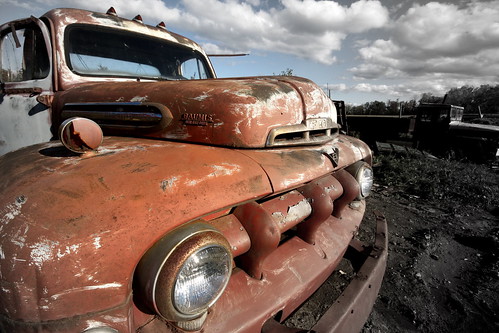
Junk Truck by Eflon, Flickr
Stop!
Before you pick up that infernal wrench stop! You may already be done.
Take this metaphor. A person dedicates her life to restoring an old pickup. She wants to see that cherry red paint gleam again, hear the throaty mantra of the diesel engine pounding. She goes in, tears an old dead lawn ornament apart, implants new shining parts. If any of the parts are broken, or have defects, her ears will know, and she will cut out the problem part like so much cancer. She is done when she can sit in the driver's seat and listen to her engine purring clean and perfectly.
We writers, like her, want to create something, some time recreate things. We want to create lives. We put in parts we know (themes, archetypes, well placed cliches) in the order their supposed to go in (introduction, crises, climax, conclusion) to make our engine (plot) purr.
Then we hate it, hate our little perfect children who did what they were told. Why? Because if we want to create lives, we must remember that Lives Are Broken. The Christians know it, the Buddhists know it, even Atheists know people are imperfect little things.
Why do we need flaws in our characters? Save for our mechanic, most people don't notice when things go right. Perfectly running breathing machines are rarely noticed. No, for some inscrutable reason the quirky, jerky, herdy-gerdy ones get all the attention. Same for people. How does Assholes Finish First get sold? Because he's a threat, and he gets your attention.
Don't make up these flaws though, just open your eyes to them. Realize just how prodigal, how unwashed, how petty, how dumb, or how arrogant your main is. Watch the world around you, especially your heroes. Find their dirt, and let your character have some too. Make a broken machine, make a rusty lawn ornament, then let that ornament restore itself through the breadth of the tale.
